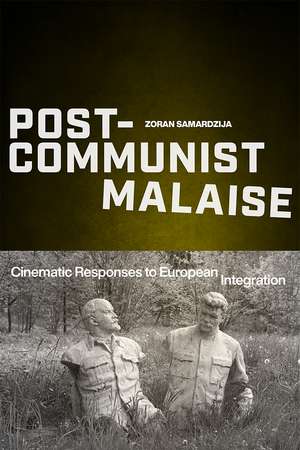Post-Communist Malaise: Cinematic Responses to European Integration: Media Matters
Autor Zoran Samardzijaen Limba Engleză Paperback – 14 mai 2020 – vârsta ani
The collapse of communism in the Soviet Union and Eastern Europe was supposed to bring about the “end of history” with capitalism and liberal democracy achieving decisive victories. Europe would now integrate and reconcile with its past. However, the aftershocks of the financial crisis of 2008—the rise in right-wing populism, austerity politics, and mass migration—have shown that the ideological divisions which haunted Europe in the twentieth century still remain. It is within this context that Post-Communist Malaise revives discourses of political modernism and revisits debates from Marxism and seventies film theory. Analyzing work of Theo Angelopoulos, Věra Chytilová, Srdjan Dragojević, Jean-Luc Godard, Miklós Jancsó, Emir Kusturica, Dušan Makavejev, Cristi Puiu, Jan Švankmajer, Andrei Tarkovsky, and Béla Tarr, the book focuses on how select cinemas from Eastern Europe and the Balkans critique the neoliberal integration of Europe whose failures fuel the rise of nationalism and right-wing politics. By politicizing art cinema from the regions, Post-Communist Malaise asks fundamental questions about film, aesthetics, and ideology. It argues for the utopian potential of the materiality of cinematic time to imagine a new political and cultural organization for Europe.
Preț: 304.44 lei
Nou
Puncte Express: 457
Preț estimativ în valută:
58.26€ • 60.95$ • 48.39£
58.26€ • 60.95$ • 48.39£
Carte indisponibilă temporar
Doresc să fiu notificat când acest titlu va fi disponibil:
Se trimite...
Preluare comenzi: 021 569.72.76
Specificații
ISBN-13: 9780813587141
ISBN-10: 081358714X
Pagini: 220
Ilustrații: 0 illustrations
Dimensiuni: 152 x 229 x 15 mm
Greutate: 0.32 kg
Ediția:None
Editura: Rutgers University Press
Colecția Rutgers University Press
Seria Media Matters
ISBN-10: 081358714X
Pagini: 220
Ilustrații: 0 illustrations
Dimensiuni: 152 x 229 x 15 mm
Greutate: 0.32 kg
Ediția:None
Editura: Rutgers University Press
Colecția Rutgers University Press
Seria Media Matters
Notă biografică
Zoran Samardzija is an associate professor in the Department of Cinema and Television Arts at Columbia College, Chicago. He is the author of essays on David Lynch, Andrei Tarkovsky, and Eastern European and Balkan cinemas.
Cuprins
Contents
Introduction
1 Eastern European New Waves and Political Modernism
2 What Happens After the End of History?
Part I From Communism to Capitalism
Part II From Capitalism to Nationalism
3 Slow Cinema and The Escape From Capitalist Realism
Part I The Materiality of Cinematic Time from Andrei Tarkovsky to Béla Tarr
Part II Cristi Puiu Between Slow Cinema and Transcendental Style
4 Theo Angelopoulos, Greece, and The Ends of Europe
Part I A New Collective Dream
Part II Cinema As Past and Future
Conclusion
Acknowledgements
Index
Introduction
1 Eastern European New Waves and Political Modernism
2 What Happens After the End of History?
Part I From Communism to Capitalism
Part II From Capitalism to Nationalism
3 Slow Cinema and The Escape From Capitalist Realism
Part I The Materiality of Cinematic Time from Andrei Tarkovsky to Béla Tarr
Part II Cristi Puiu Between Slow Cinema and Transcendental Style
4 Theo Angelopoulos, Greece, and The Ends of Europe
Part I A New Collective Dream
Part II Cinema As Past and Future
Conclusion
Acknowledgements
Index
Recenzii
"Forging upstream against critical currents, Samardzija’s book stubbornly holds out for the principle of aesthetic hope, extracted from the carapace of political modernism with a set of sharp theoretical tools. Within the unique neither-quite-West-nor-anymore-East terrain of Europe’s post-communist countries, he finds a set of films capable of giving shape to the 'post-communist malaise' by capturing and making visible the gap between the expired promises of universal utopia and the disenchantments and exclusions of neoliberal Euro markets. His ingenious close readings bring the revisionist contours of such latent hope to light."
Descriere
Post-Communist Malaise examines political modernism within the context of post-communist Eastern Europe and the Balkans. It focuses on how select cinemas from the regions critique European unification and how they represent related issues like the transition from communism to free-market capitalism, the Euro crisis and austerity, and the rise of nationalism and right-wing politics.


